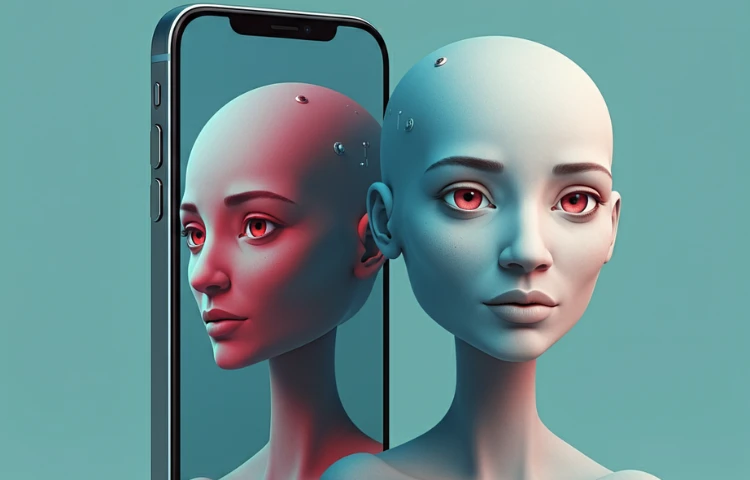

Prefer to listen instead? Here’s the podcast version of this article.
The concept of an “AI doppelganger” has recently captivated social media, sparking discussions on both its potential and its ethical implications. Imagine a digital version of yourself, crafted by artificial intelligence, capable of chatting, answering questions, and even replicating your voice and mannerisms. Major tech companies like Meta are pioneering these AI-driven personas, bringing the futuristic allure of an AI-powered double into our daily interactions on platforms like Instagram. In this post, we’ll dive into the significance of AI doppelgangers, examine how they’re reshaping social media, and explore related trends in generative AI that are revolutionizing content creation, software engineering, and personal productivity.
Meta’s development of AI-powered personas, which allow Instagram users to interact with digital “doppelgangers” of themselves, is leading the charge in this space. Users are now able to generate realistic avatars capable of engaging with others online. This innovative feature blurs the line between virtual and real-world interactions, empowering users to delegate some of their online engagement to these AI-driven doubles. This trend has gained traction as a way for influencers, celebrities, and everyday users to create an engaging online presence without being constantly available.
For those interested in exploring this trend further, an excellent analysis of Meta’s strategy and the rise of AI doppelgangers can be found in New York Magazine’s article, Who Needs an AI Doppelganger?. This piece breaks down how Meta envisions AI doppelgangers enhancing social media and what that could mean for privacy and personal identity.
Beyond social media, AI agents are now being deployed to handle repetitive and time-consuming tasks, potentially saving hours each week. These AI agents are growing increasingly proficient in a range of industries, particularly in software engineering, where their capacity to generate and debug code has skyrocketed. This trend is not limited to developers; many organizations are adopting AI agents for tasks such as data analysis, report generation, and even customer support.
Dario Amodei, CEO of Anthropic, and Sam Altman, CEO of OpenAI, predict that AI agents will soon handle up to 90% of repetitive digital tasks, allowing people to focus on higher-level strategic work. This evolution is discussed in greater detail in [AI Agents Are Coming to Take Away Your Busy Work] by Barron’s, which explores how AI agents are reshaping productivity and job roles.
For a broader look at how AI agents may redefine job markets and employee roles, see the Quantilus blog, [How Automation is Changing the Workforce], which covers trends in automation and AI’s role in evolving workplace dynamics.
With AI’s capabilities advancing quickly, the industry is also grappling with how to measure these technologies effectively. Traditional benchmarks, initially designed for early AI models, are quickly becoming obsolete as models like GPT-4 and Claude by Anthropic continue to break records. In response, leading AI companies such as OpenAI, Meta, and Microsoft are working on creating new evaluation methods tailored to today’s cutting-edge AI models.
For an in-depth analysis of this topic, Financial Times’ article Why AI Needs New Evaluation Standards highlights the necessity of evolving these benchmarks, providing insight into how organizations are adapting to this rapid advancement. This evaluation shift has significant implications for ensuring the responsible deployment of AI, an issue Quantilus has also explored in its post [Ethical AI: The Standards That Matter].
Interestingly, AI tools are beginning to play a significant role in personal care and wellness, with Gen Z users turning to ChatGPT for personalized skincare advice. While the thought of consulting an AI for skin recommendations might seem unconventional, it illustrates the growing trust people have in AI’s ability to deliver customized information. Brands in the beauty industry are now exploring how they can harness this trend to engage consumers in innovative ways.
For more on this development, Vogue Business’s article Gen Z is Using ChatGPT as a Dermatologist discusses how AI is influencing brand strategies in the beauty and wellness sectors.
If you’re interested in learning how AI can enhance other aspects of consumer decision-making, Quantilus’ blog, [The Power of AI in Retail and Consumer Insights], provides additional insights on AI’s expanding influence in consumer behavior.
As AI technology continues to evolve, the potential applications—from creating social media doppelgangers to generating creative content—are practically limitless. However, with this growth comes responsibility. Tech companies, businesses, and consumers alike must navigate the ethical, practical, and personal implications of integrating AI into daily life. Embracing this technology thoughtfully can lead to tremendous benefits, but it’s essential to remain informed and critical of the advancements unfolding around us.
WEBINAR